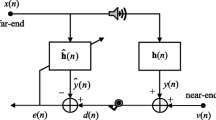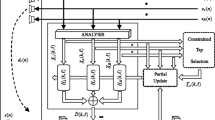Abstract
Filtered white noise is the training signal typically used to test the performance of echo cancellers. However, a system optimized for operation with such training signals may perform poorly when trained instead with voiced speech. This performance difference is a consequence of the quasi-periodic nature of voiced speech. In this paper, we explore the effects of quasi-periodic training signals on echo-canceller performance. In particular, we show that unlike filtered white noise, quasi-periodic training signals can actually limit the asymptotic echo-return loss of echo cancellers. In addition, we examine the ability of several existing techniques to improve performance when quasi-periodic signals are used to train echo cancellers.
Résumé
Le bruit blanc filtré est un signal d’apprentissage couramment utilisé pour tester les performances des annu-leurs d’écho. Toutefois, un système optimisé pour fonctionner avec de tels signaux d’apprentissage peut donner de mauvaises performances sur le signal de parole. Cette dégradation des performances est une conséquence du caractère quasi périodique de la parole voisée. Dans cet article, les auteurs étudient l’effet de signaux d’apprentissage quasi périodiques sur les performances d’algorithmes d’annulation d’écho et montrent en particulier, que, contrairement au bruit blanc filtré, les signaux d’apprentissage quasi-périodiques peuvent effectivement limiter l’atténuation asymptotique de l’écho apportée par les annuleurs. De plus, ils examinent la capacité de plusieurs techniques existantes à améliorer les performances en présence de signaux d’apprentissage quasi-périodiques.
Similar content being viewed by others
References
Dentino (J), McCOOL (J.), Woodrow (B.). Adaptive filtering in the frequency domain.Proc. IEEE (Dec. 1978),66, n° 12, pp. 1658–1659.
Narayan (S. S.), Peterson (A. M.). Frequency domain least-mean-square algorithm.Proc. IEEE (Jan. 1981),69, n° 1, pp. 124–126.
Schultheiß (U.). Uber die Adaption eines Kompensators für akustische Echos.Fortschr-Ber. VD1 Teihe 10, Nr. 90, VDI-Verlag Dusseldorf (1988).
Marino (S.), Kaneda (Y.), Koizumi (N.). Exponentially weighted stepsize nlms adaptive filter based on statistics of a room impulse response.IEEE Trans. SAP (Jan. 1993),1, n° 1.
Yamamoto (S.), Kitayama (S.), Tamura (J.), Ishigami (H.). An adaptive echo canceller with linear predictor.Trans. of the IECE of Japan, E62 (1979), pp. 851–857.
Dohnal (F.). Generalized frequency domain adaptive filter and its application for acoustic echo canceller.Proc. of the 3rd International Workshop on Acoustic Echo Control, Plestin-les-Grèves (Sep. 1993).
Author information
Authors and Affiliations
Rights and permissions
About this article
Cite this article
McCaslin, S., van Bavel, N. Effects of quasi-periodic training signals on acoustic echo canceller performance. Ann. Télécommun. 49, 380–385 (1994). https://doi.org/10.1007/BF02999426
Received:
Issue Date:
DOI: https://doi.org/10.1007/BF02999426




